by Mary Shaver and Michael G. Stewart.
 |
| Sam Andrew. Photo by Michael G. Stewart. |
Late last year, Big Brother and the Holding Company performed at the campus of Montgomery College in Rockville, Maryland. D.C. Photographer Michael G. Stewart and I met guitarist Sam Andrew, who talked about the group, Janis Joplin, the band’s history and about Sam’s latest ventures. Imagine being a guitarist in one of the most successful rock blues bands of the ’70s with your days filled with limos, women, drugs and the other temptations that go along with rockdom. Some hard hitting performers didn’t make it through the ’70s. Most, though, managed to steer clear of the cliffs and by sheer luck not only did they survive, they now find themselves thriving on the music that continues to energize each new generation.
Sam Andrew, guitarist par excellence for Big Brother and the Holding Company (BBHC), is one of the survivors.
As one of the founding members of Big Brother and the Holding Company, a musical group with an energy that was once raw and electric, Andrew now finds himself happy and looking good for a rock ‘n’ roller of 66 years. He sat with us, embracing his black PRS guitar, while he thoughtfully responded to our questions with enthusiasm and charm.
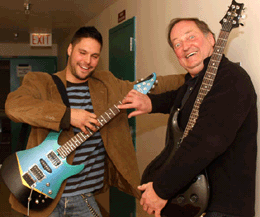 |
| Ben Nieves and Sam Andrew. Photo by Michael G. Stewart. |
Both he and guitarist Ben Nieves are on the tour. Nieves took over the role that James Gurley holds, at least for road trips. With decades separating Nieves and Andrew, it’s remarkable how the two guitarists connect on stage, communicating in a way that galvanizes the BBHC sound.
Sam offers up, “When James Gurley and I first started working together in Big Brother, it took nearly two years before we could really communicate effectively.”
Sam’s and Ben’s musical backgrounds track along the same path with their mutual love of jazz, gospel and soul forming a strong harmonic bond. It shows on stage, especially when they unleash the opening riffs of “Summertime,” a standard that Joplin and the group covered. Andrew’s and Gurley’s work on that track garnered praise from Guitar Player magazine, naming the track as having one of the top 10 psychedelic solos in rock history.
Andrews has three platinum albums and two hit singles to be proud of, including two classic songs he wrote for Janis, “Call on Me,” and his hard driving “Combination of the Two.”
Sam reminisced with us about the early days of Big Brother and the Holding Company, including his work with Janis. He’s lived rock ‘n’ roll and R&B when it was raw and explosive, during an era when a mix of styles and experimentation became the “psychedelic sound.”
Besides touring with Big Brother, Sam leads his own Sam Andrew Band, serves as the musical director for the play Love, Janis and focuses his spare time on writing symphonic pieces. He was savvy enough to hold on to the rights of his music that help keep him financially rewarded. But, he’s still a road dawg at heart and keeps in good form by getting on stage, rolling out guitar riffs that are distinctly his own and timeless.
Modern Guitars: Sam, let’s start off with a little background on the beginnings of Big Brother and the Holding Company.
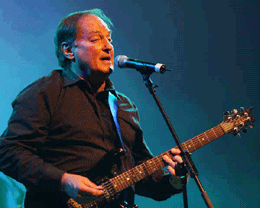 |
| Sam Andrew. Photo by Michael G. Stewart. |
Sam Andrew: I founded Big Brother a long time ago with Peter Albin. We were lucky enough to have a woman come into that band a year after we were going, Janis Joplin. She was so great! I can’t say enough about her, a great singer, the best, a real pro.
Ben Nieves is a hundred times better than I am, probably better than anyone who played in that era. His education is so much better. But, he’s also followed in the footsteps of all of us who came before. Watch out for him. He’s really going places. He’s got that warm Puerto Rican soul, plus he’s from Cleveland, Ohio. If James and I had this guy in the room, we would have been totally frightened. We could have never played another note. He plays a Brian Moore guitar, really nice.
When I started playing in San Antonio, Texas, I was about 14. Later, I was hearing people like Bill Doggett, Bukka White, “Mississippi” Fred McDowell , Mance Lipscomb, especially T-Bone Walker and Charlie Christian. These days, I tend to listen to a lot of jazz.
MG: How did you complement one another as guitar players?
Sam: It was really difficult for me to play with James Gurley at first. He was an untaught, unschooled player. If you wanted him to play a C chord, you had to show him where to put his fingers on the neck. On the other hand, he was somehow way more advanced than any of the rest us, a weird combination of things socially and musically. He’d been listening to Lightning Hopkins, people like that, a lot of what we’d call world music today. Ornette Coleman, wild stuff, and he took that as his departure point.
Basically, I was European trained. I knew what scales were, what a mode was. Gurley didn’t know any of that consciously. But, he played it all intuitively. It took about two years for us to learn to talk to each other. But, it was really fun when it happened. It almost had to be non-verbal.
We were the house band at the Avalon, Chet’s place [Legendary San Francisco promoter and BBHC founding manager , Chet Helms]. He brought us Janis Joplin, who he went to school with in Texas, and James Gurley.
MG: Is James still playing?
Sam: He lives in Cupertino, California with his wife Margaret, a beautiful person and in Palm Desert, California. He loves it there. He was always destined for the desert. He was alternative way before it was hip. He probably invented it! Eclectic, a very intuitive player and primitive, like John Fahey.
MG: Ben, who do you listen to? Who are your inflluences?
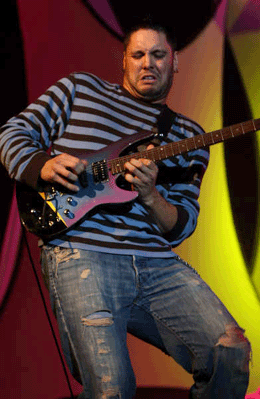 |
| Ben Nieves. Photo by Michael G. Stewart. |
Ben Nieves: A lot of different styles, B.B. King, Stevie Ray Vaughan, Jimi Hendrix, of course, then there’s George Benson and Joe Pass. More jazz and blues, my teacher was a blues player and that’s what I grew up with. Robben Ford, there’s a real fusion of ideas, Coltrane, Bird and Miles Davis. I love that stuff! I play in a gospel church in Cleveland too. My most recent thing is a lot of R&B and soul.
MG: How much of a stretch is it to play this 60’s style psychedelic rock?
Ben: I grew up playing a lot of that ’70s type rock-blues, and played the Love, Janis show. Sam is the director of the show. It’s really a fun time.
MG: Sam, do you want to comment?
Sam Andrew: We hired this band that looks kind of like we did at the time. I was about 24. They’re great players and it’s really fun to hear them do our songs.
MG: What gear did you use then and what are you using now?
It was constantly evolving. We started out, improbably enough, with Standel amplifiers, solid state, they were tall, and we loved them at the time.
John Cipolina [Quicksilver Messenger Service] was a real techie, always checking things out. But, then we signed with Columbia Records, who were associated with CBS and Fender, to do Cheap Thrills. So, that brought in Twin Reverbs. For a while I played a Corel electric sitar [Laughs], SGs, of course. But, it was constantly evolving.
Nowadays, we go on the road and Ben and I take whatever they give us, in the way of amps. I request tube amps, either Twin Reverbs or Marshalls. It depends on what’s available. In some towns, you just play what you can get and hope for the best.
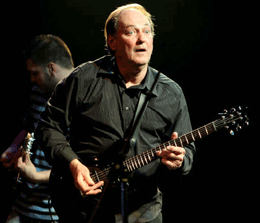 |
| Sam Andrew. Photo by Michael G. Stewart. |
Sam:One night, it may be the toughest night, because you just can’t get your sound or tone. The next may hit it just right. But, you just can’t haul that much equipment these days. I’m always trying to travel really light. I’m trying to find a great pedal that has just two or three great effects and a tuner built-in, that I can work on stage. But, I always find ones with either too many or too few. I’d really like to get another SG like I had in the ’60s. It had that great neck and wonderful sustain.
I now have a Paul Reed Smith. He was nice enough to give it to me. Paul said “ You can have any one you want.” I said, “Any color as long as it’s simple, black.”
I love it! It has a real nice sound! I’ve had it awhile and it just sounds great! I hear they have that new model out [the Mira]. That would be nice to try out. My father was an officer in the Air Force. He played guitar. He played an old Harmony archtop, with f-holes. When he was transferred to Okinawa, I sold that, traded it for a Silvertone. It looked like a Buick or something, chrome pick-ups, the works. I played Japanese guitars a lot early on too.
MG: Are you writing much? Will there be more records?
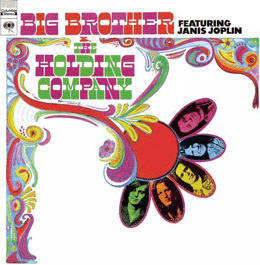 |
| Big Brother And The Holding Company: featuring Janis Joplin |
Sam: I’m writing all the time. Of course, if you’re a creative person, motivated, you can write two or three songs a day. The really hard part is the diplomatic skill in convincing your band members to do those songs! That’s the hard part.
It’s hard not to dwell on the past, especially in our case. Janis would always go “Gee, that sounds like a real song! That sounds like Bob Dylan or something!” The guys would be going like”Oh, I’m not sure we want to learn that.”
At the beginning, Peter [Albin] was the leader. But, as things went on, Janis sort of took that role. She took over that part of it. Then, after her death, I guess I was the leader. We had a work ethic. When Janis and I would come home from a gig, we’d talk about, “Well, what about a solo after that verse?”
We’d try to think it out. Every now and then, I’ll write something for my wife, who plays classical piano. She plays with a flautist. I have notebooks and notebooks filled with serious music.
Jack Casady [Hot Tuna/ Jefferson Airplane] asked me the most poignant question about jazz. I had played him a couple chords [strums a jazz progression] and he says, “ Did you learn that from the Mickey Baker book?” He knew exactly where it came from. That guy is something else, a phenomenal bass player!
Anyone could relate to Janis. She could truly sing. She hadn’t done her best singing yet. She died before she was able to do her best work. She had structure, discipline and heart. She was the real deal! With Big Brother playing behind her, there was always this fear that the band would drive the car over the edge, musically, with our weird, original sound. But, we complemented her in wonderful ways, as far as we got.
It was all too short. I do think that Big Brother was the best band for her. We weren’t quite professional enough to get in her way. She was clearly the main force in that band. We really complemented her in a really ramshackle, rough-shod sort of way. But, it worked. Perhaps, if she had lived longer and been with the Full Tilt Boogie Band, that could have been her best band. But, as it stands, I think Big Brother will always be the band that people remember Janis for.
At one point, Janis was asked to join a band with Ry Cooder and Taj Mahal called the Seven Wonders. But, for her own reasons, turned them down. I think if that had happened, she might have been overshadowed by the musicians in the band. They were so good. But,with us, she was always able to be the real focus.
Today, I practice more than I ever did. I’m an artist, so I start the day by painting two or three hours, then go home and practice two or three hours. Right now, scarey as it may seem, I probably am playing better than I ever have in my life. We evolve as we get older.
MG: What other projects do you have in the works?
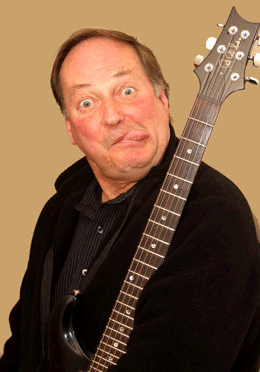 |
| Sam Andrew. Photo by Michael G. Stewart. |
Sam: As I said, I’m music director for the Love, Janis stage production. I paint every day, portraits in oil. I continue to write new music all the time, that I hope will make it to release sometime soon. I love touring with Big Brother. It continues to be such fun! I was lucky enough to play with one of the greatest singers of all time, Janis. But, with the current group, we’ve had the greatest singers around today singing with us. They are just amazing!
Lynn Asher, who’s with us now, is just a tremendous talent. A beautiful woman and a powerful voice, really great! All the singers who’ve played with us, Lisa Mills, Sophia (Ramos), Lisa Battle, all of them bring their own unique feel to the original material. Janis would be happy to see her legacy carried on so well.
MG: Who’s turning out to see you these days? Who is the 21st Century Big Brother fan?
Sam: Everywhere we go, all over the world, Japan, Germany, there are people my age. But, also teenagers, seventeen year olds, who know all the words, every lick! We have parents, who were total hippies, bringing their kids along. And they all love it! They just love the music! They come as a family. It’s very gratifying.
MG: Do you still enjoy playing?
Sam: Absolutely! It’s still fun. Because I don’t do drugs, I’m much more alive to everything these days. It seems like more fun now. But, who knows? Maybe, it was more fun then but I was too stoned to know it!
Related Links
Big Brother and the Holding Company
Concert Review: Big Brother and the Holding Company
Love, Janis: The Musical
Michael G. Stewart Photography